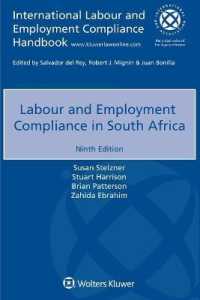基本説明
Not only changing institutions, but also global environmental change, pose huge challenges for spatial planning. This book discusses how planning by law and property rights can respond to those challenges : by adaptive planning, by adaptable property rights, and by public policies at the appropriate geographical level.
Full Description
Countries which take spatial planning seriously should take planning law and property rights also seriously. There is an unavoidable logical relationship between planning, law, and property rights. However, planning by law and property rights is so familiar and taken for granted that we do not think about the theory behind it. As a result, we do not think abstractly about its strengths and weaknesses, about what can be achieved with it and what not, how it can be improved, how it could be complemented. Such reflections are essential to cope with current and future challenges to spatial planning. This book makes the (often implicit) theory behind planning by law and property rights explicit and relates it to those challenges. It starts by setting out what is understood by planning by law and property rights, and investigates - theoretically and by game simulation - the relationships between planning law and property rights. It then places planning law and property rights within their institutional setting at three different scales: when a country undergoes enormous social and political change, when there is fundamental political debate about the power of the state within a country, and when a country changes its legislation in response to European policy. Not only changing institutions, but also global environmental change, pose huge challenges for spatial planning. The book discusses how planning by law and property rights can respond to those challenges: by adaptive planning), by adaptable property rights, and by public policies at the appropriate geographical level. Planning by law and property rights can fix a local regime of property rights which turns out to be inappropriate but difficult to change. It questions whether such regimes can be changed and whether planning agencies can make such undesirable lock-ins less likely by reducing market uncertainty and, if so, by what means.
Contents
Contents: Introduction: why reconsider planning by law and property rights? Thomas Hartmann and Barrie Needham; Part I Methods for Exploring the Possibilities: Interests and rights in property, and their place in land-use; Exploring the effects of property rights using game simulation, Esther Geuting and Barrie Needham. Part II Coping with the Wider Institutional Framework: Planning law reform and change in post-apartheid South Africa, Mark Oranje and Stephen Berrisford; Talking about property rights over tea: discourse and policy in the US and Europe, Harvey M. Jacobs; Managing riverside property: spatial water management in Germany from a Dutch perspective, Thomas Hartmann and Tejo Spit. Part III Coping with Environmental Change: Improving institutional conditions for adaptive planning in the Netherlands, Joost Tennekes; Global climate change and the stability of property rights, A. Dan Tarlock; Government or governance? The challenge of planning for sustainability in the Ruhr, Michael Wegener. Part IV Coping with Uncertainty and Lock-Ins: Planning and uncertainty: how Dutch municipalities try to reduce uncertainty on the market for industrial properties, Huub Ploegmakers and Erwin van der Krabben; The Dutch office space tragedy: unlocking the lock-in, Leonie B. Janssen-Jansen; The fraught relationship and the conflicts in dealing with uncertainty, Edwin Buitelaar; Conclusion, Barrie Needham and Thomas Hartmann; Index.







